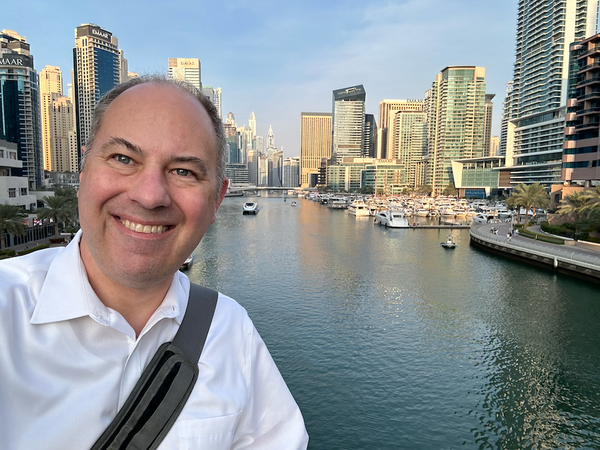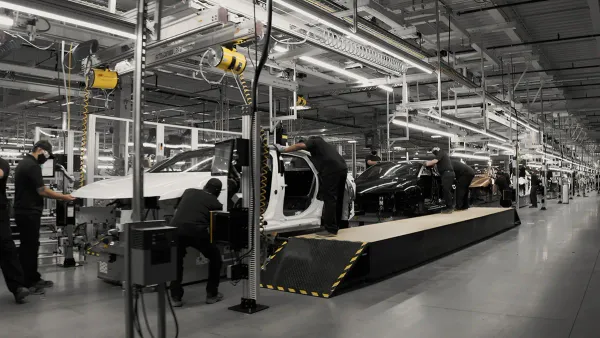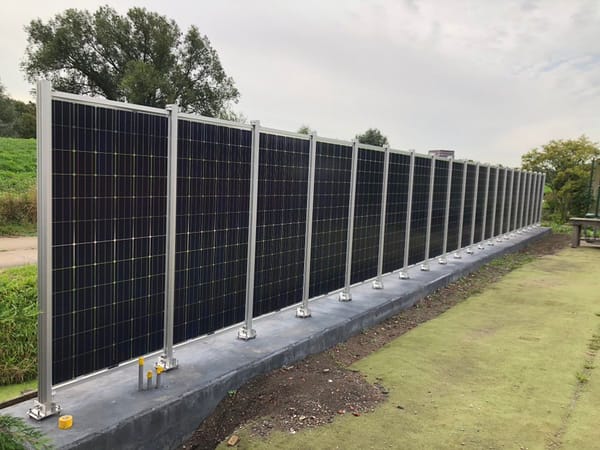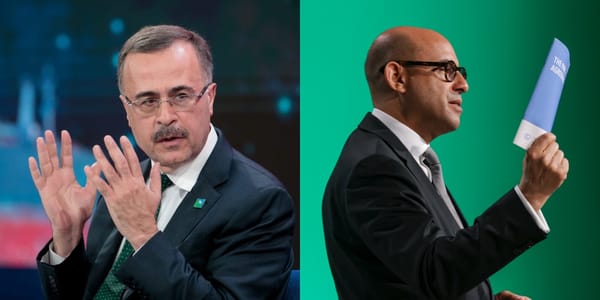Report from Dubai: The ministers prepare to take over
Good evening from Dubai,
Today’s report is a bit late because the end of the day was just plain crazytown. I explain more below, but everyone was racing to get things done and a ton of events and meetings were jammed in in the last couple hours of the day. Then I had to get home and get my clothes to the dry cleaner before they closed. Yeah. It’s the sexy, international life for me, baby.
No report tomorrow, because it’s the official COP off day. I’ll be back on Friday.
Anyway, let’s get to it.
-Mike
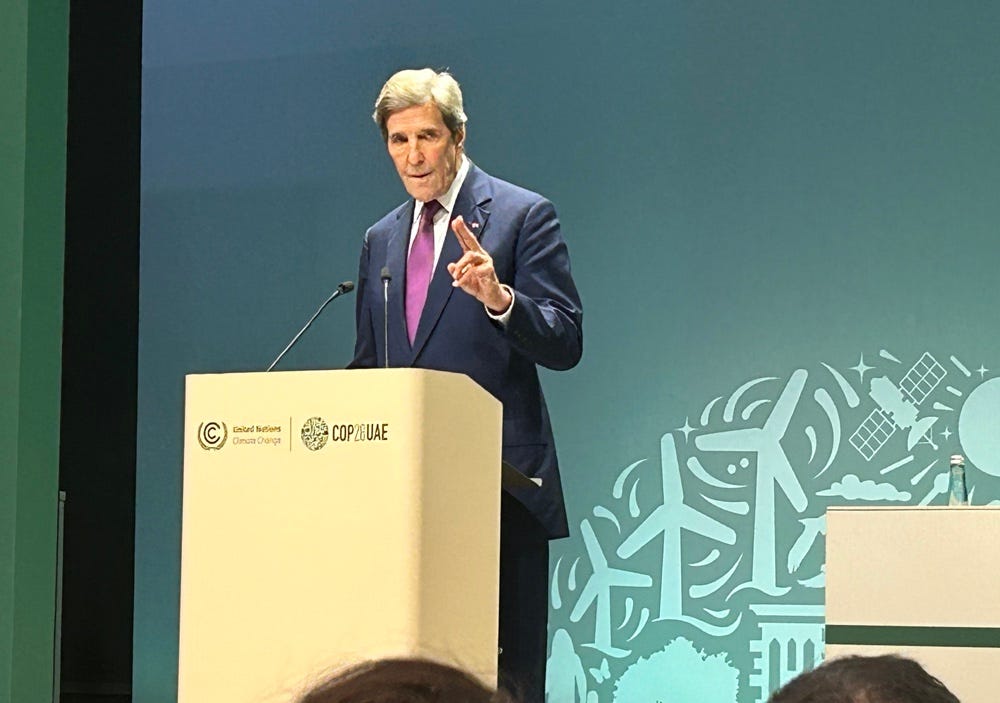
What happened today
Today was the last day of the “technical portion” of the conference, where various committees meet to draft and discuss a series of difference texts. Some of the different committees include the Global Stocktake response, approval of rules for carbon credit trading, statements on the goals of the Loss and Damages Fund, and the expected role of countries for climate financing.
While these are all weighty matters, the Stocktake response and carbon credit trading texts are most likely to impact the global economy more than anything else – so they’ve been attracting the most attention.
In case you’re just tuning in, the Global Stocktake is an every-five-years review of where the world stands on dealing with climate change. It was mandated by the Paris Agreement, and this year was the first one, with a report released in September. The idea is that after each Stocktake countries should alter their climate response plans accordingly (always do more). In addition, part of the COP28 agenda is to write a Global Stocktake response text that includes commitments from countries on what additional things they will do to improve the climate. The debate over that response – which I discuss more below – is intense and likely to provoke the biggest disagreements of the conference.
Meanwhile, there’s a mandated break tomorrow – nobody’s allowed on the COP campus – so committees are racing to finish negotiations, advocates have been lining up to make their most strident statements, and world leaders have been conducting “mid-COP” press conferences to let us know how they think things are going. While technical experts managed the discussions at the beginning – they tend to work with scalpels – politicians and high-ranking diplomats get involved in round two – and they tend to work with meat cleavers.
As a result, there’s a certain frenzy to get in textual changes before the conference moves to the “ministerial round” next week. Ministers are less interested than their minions in the niceties of how an idea might work than they are in political outcomes. For delicate issues where there might be disagreement, a committee might list multiple alternative texts. These alternatives become the baseline for discussions among the ministers and can lead to very different outcomes, depending on their wording.
Also, there tends to be a changing of the guard among attendees after the break day. Staying at COP for two weeks is a heavy lift for lots of people (I can testify to that), so many observers and non-critical government staff head home on the break day, while another shift comes in for the second part.
One big issue
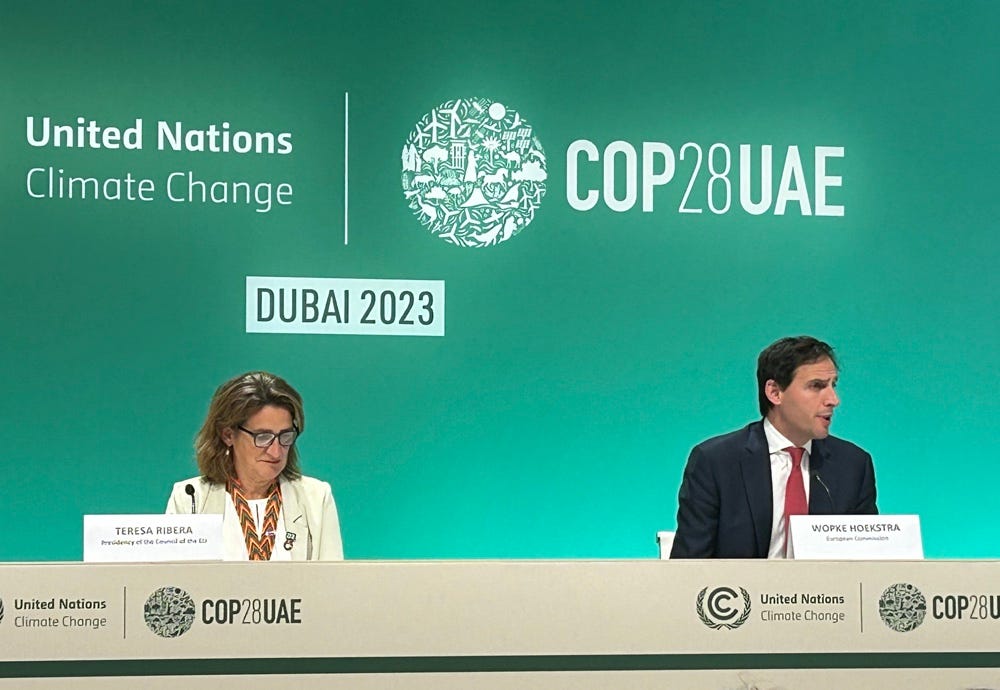
This newsletter has been talking about the issue of “phase out” versus “phase down” for fossil fuels and the importance of the word “abate” since July. The issue is only getting hotter now that negotiators are ending the technical phase and language is going to ministers to debate.
Meanwhile, climate advocates and scientists have been stressing all week that the only way to keep under 2°C – forget staying under 1.5°C – is to work towards a phase out of all fossil fuels by 2050.
“We are going to overshoot 1.5 degrees of warming rather soon,” said Dr. Manjana Mailkoreit, from the University of Oslo today, talking about the state of climate change, “We have to minimize the level of risks during that warming period – to bring things down to 1.5 degrees during that period.”
Of course, the chief way to minimize those risks, according to a new report produced by Dr. Mailkoreit and others, is to immediately begin to phase out fossil fuels.
Almost as if he was speaking from the same script as Mailkoreit, in a separate press conference this afternoon, the EU climate chief, Wopke Hoekstra, said, “There is no magic solution. No alternative to phasing out fossil fuels.”
The world must peak its fossil fuel use by 2025 and enact a 43% reduction in fossil fuel use by 2030 if it has any hope of staying under 1.5°C of warming, he said.
Then, in a press conference of his own this afternoon, U.S. Chief Climate Envoy, John Kerry said, “Science requires net zero emissions by 2050. The science requires about a 43% reduction by 2030.”
Pressed by reporters to say whether or not he’s pushing for a phase out, Kerry said, “If you’re going to reduce the emissions, and hit the target, you’re going to have to do some phasing out.”
Beyond that, Kerry didn’t say or commit to much. A Japanese reporter asked Kerry if he’d provide his negotiations red lines. Kerry laughed it off, saying that he didn’t want to make things any harder for his team.
“We sort of inherently know on our team what the red lines are, but we haven’t laid them out.”
I found that hard to believe.
As I reported yesterday, the most recent draft of the Global Stocktake text includes three options:
Option 1: An orderly and just phase out of fossil fuels;
Option 2: Accelerating efforts towards phasing out unabated fossil fuels and to CO2 or around mid-century;
Option 3: no text
There were further discussions (closed to the press) today, but word was that another draft will likely be released before ministerial discussions begin on Friday.
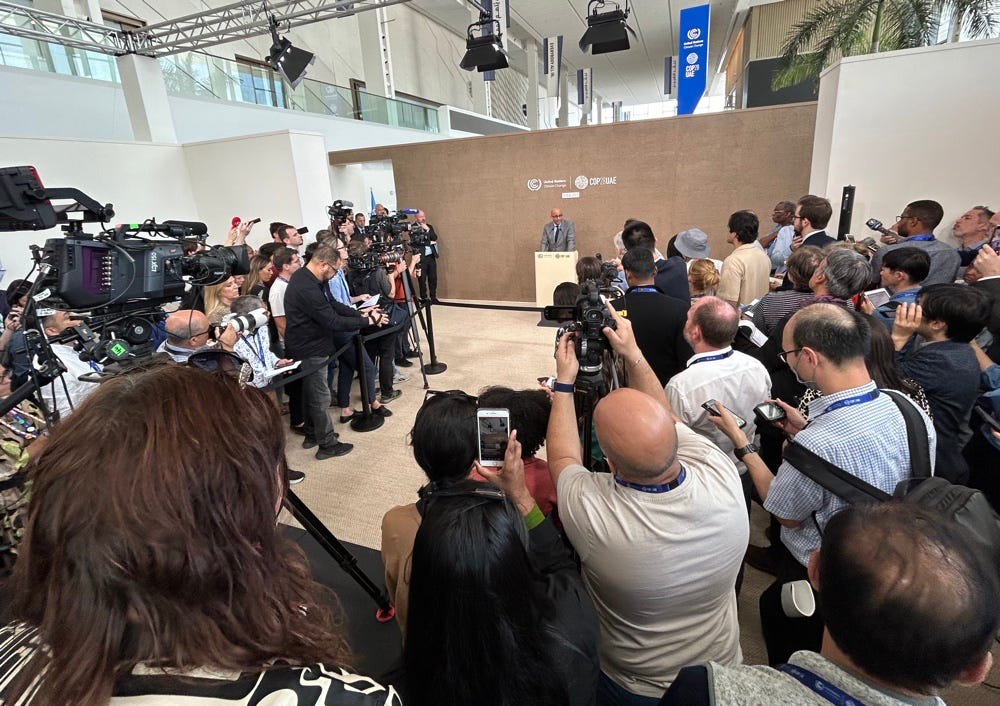
Perhaps, though, the most curious thing to happen today was a snap presser held by Simon Stiel, the UNFCCC Executive Secretary, essentially the chief administrator of the whole climate negotiations process.
With less than 30 minutes notice, Stiel strode out to deliver a brief statement to the press, took two questions, and then left. What did he say? Basically, that the conference should endorse some kind of fossil fuel phase out.
“At the end of next week we need COP to deliver a bullet train to speed up climate action. We currently have an old caboose chugging over rickety tracks. But the tools are all there on the table. The technologies and solutions exist. It's time for governments and negotiators to pick them up and put them down,” he said.
Viewed from the outside, it was strange timing. But I’m willing to bet Stiel’s audience was not us, but rather negotiators. Someone on the inside is blocking forward progress, so Stiel wanted to rally the troops.
What I did today
Mostly I hustled from one press conference to another, but I took a break to watch a panel presentation with an old Chicago politics source, Anton Seals, as he and others talked about how they try to take climate action local. It was fun to shift gears a bit and then Anton walked me over to an office space maintained on site by the sponsoring organizing. It was amazing, filled with nice chairs, quiet space to work, and a person running a high-end coffee bar. Most of the big foundations are running places like this around COP28, but this was the first time I got to see how the other half (non press) lives.

I’m taking the day off tomorrow, as is everyone else at COP. So, I’m going to do some tourist stuff by visiting the tallest building in the world, Burj Kalifa, and the city’s old souk. I’m looking to buy some fresh dates, because I’m told they’re amazing.
See you on Friday!


